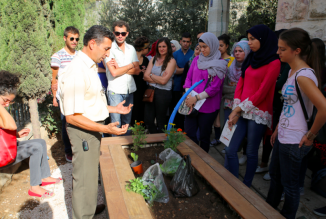Sakiya’s long-term approach maintains that through integrating farming and agrarian heritage into the fabric of contemporary arts and sciences, both sectors can be enriched, challenging the class divide between urban and rural, which characterises many cultural institutions in Palestine. The first phase of Sakiya, launched in 2016 during the Qalandiya International III biennial, in partnership with the Khalil Sakakini Cultural Centre, was marked by the establishment of a Garden Laboratory with local agro-ecologist Saad Dagher. It facilitated such sustainable agricultural practices as botanical research; a Compost Centre innovatively made from modified cement mixers and serviced by local restaurants and residents; a Library Project; a regional, open source networked library featuring a custom built, portable BookScanner courtesy of Marcell Mars, in collaboration with Beth Stryker and Cairo’s Cluster Group’s PILOT library initiative and an inter-city Moving Garden project by the Danish artist Anika Barkan.
Framing these components, Sinnokrot curated Under the Tree – Taxonomy, Empire and Reclaiming the Commons, an academic roundtable discussion moderated by Dr. Shela Sheikh, on the colonial legacies of botanical classification featuring the participation of local academics and farmers including Dr. Omar Tesdell and Dr. Munir Fakher Eldin.
About the artist
Sakiya is an international Art/Science/Agriculture residency programme with a mandate to bring international and local practitioners together for academic, artistic and ecological interventions emphasising sustainable practices across disciplines. Founded by artist Nida Sinnokrot and architect Sahar Qawasmi, Sakiya arose from a belief that cultural initiatives must recognise and halt the extremism affecting our societies, politics and environment alike and as such become a potent artwork in itself.

